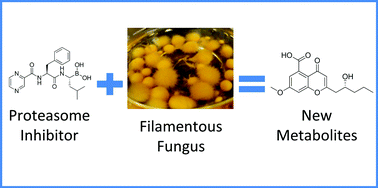Epigenetic manipulation of a filamentous fungus by the proteasome-inhibitor bortezomib induces the production of an additional secondary metabolite†
Abstract
The use of epigenetic modifiers, such as histone deacetylase inhibitors and DNA methyltransferase inhibitors, has been explored increasingly as a technique to induce the production of additional microbial secondary metabolites. The application of such molecules to microbial cultures has been shown to upregulate otherwise suppressed genes, and in several cases has led to the production of new molecular structures. In this study, the proteasome inhibitor bortezomib was used to induce the production of an additional metabolite from a filamentous fungus (Pleosporales). The induced metabolite was previously isolated from a plant, but the configuration was not assigned until now; in addition, an analogue was isolated from a degraded sample, yielding a new compound. Proteasome inhibitors have not previously been used in this application and offer an additional tool for microbial genome mining.


 Please wait while we load your content...
Please wait while we load your content...